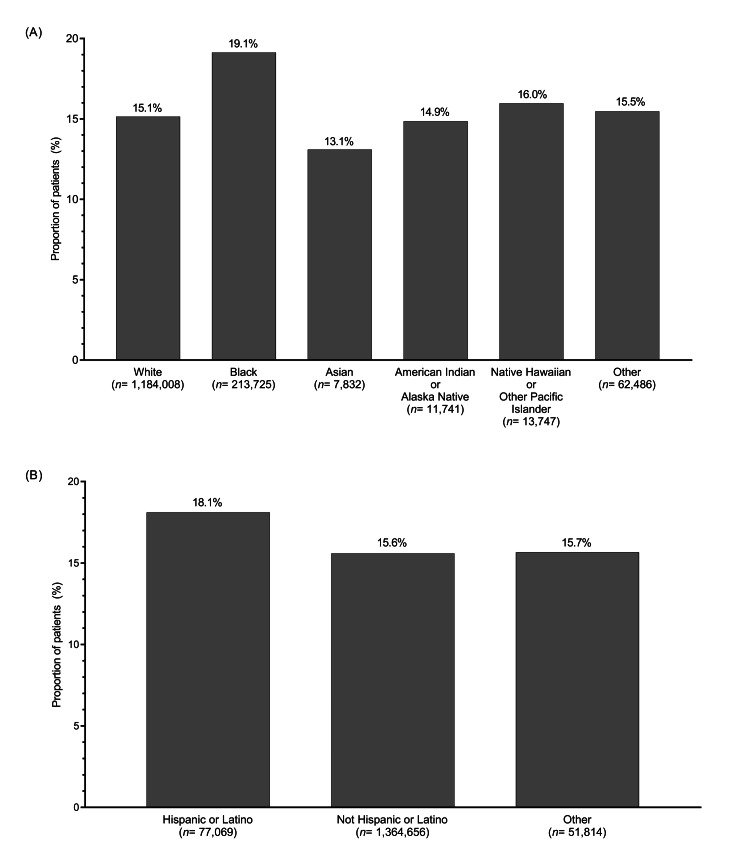
Click to Enlarge: Proportion of patients with recurrent hyperkalemia within one year after the index hyperkalemia event by (A) race and (B) ethnicity Source: Cureus
LONG BEACH, CA — In U.S. veterans with incident hyperkalemia, the risk of recurrent hyperkalemia within one year is higher in Black and Hispanic patients, according to a recent study.
The retrospective observational study published in Cureus examined the association between race or ethnicity and recurrent hyperkalemia in a population of U.S. veterans. The study authors are affiliated with Tibor Rubin VAMC in Long Beach, CA.1
Hyperkalemia, which is defined as abnormally elevated serum potassium (K+) levels of >5.0 mmol/L, can cause severe cardiac arrhythmias and increase mortality. Patients with comorbidities such as chronic kidney disease, diabetes or heart failure are at increased risk of hyperkalemia, which can also be associated with peripheral neuropathy and is a common manifestation of Type 4 renal tubular acidosis, according to the study.
Other patients at increased risk of hyperkalemia include those on renin-angiotensin-aldosterone system (RAAS) inhibitors, which are commonly used in the management of hypertension, proteinuric chronic kidney disease and secondary prevention of cardiovascular disease. Making the issue especially significant for the VA is that additional risk factors for hyperkalemia include advanced age, male sex, hospitalizations and beta-blocker use.
The researchers sought to investigate whether race and ethnicity are associated with a greater risk of recurrent hyperkalemia because information on this topic is limited. To do that, the study team used the VA Data Corporate Warehouse to identify adults with one or more serum K+ measurements of >5.0 mmol/L between January 2004 and December 2018.
Study participants were nearly 1.5 million veterans with incident hyperkalemia and a median age of 61. The researchers focused on determining the number of patients with hyperkalemia recurrence, defined as more than one subsequent event, within one year for different racial and ethnic groups.
Hyperkalemia in More Than 15%
In the total study population, 234,807 patients (15.7%) had hyperkalemia recurrence within one year after the index hyperkalemia event occurred. The researchers reported that, when analyzed by race, the proportion of patients with hyperkalemia recurrence within one year was highest among Black patients (19.1%; n=40,879), followed by Native Hawaiian or other Pacific Islander patients (16.0%; n=2,196). Asian patients had the lowest rate of recurrent hyperkalemia (13.1%; n=1,026).
“Race and ethnicity were both significantly associated with hyperkalemia recurrence within one year after the index hyperkalemia event,” the authors pointed out, adding that the risk was “significantly higher in Black versus white patients and patients with Hispanic or Latino ethnicity versus those without, and significantly lower in American Indian or Alaska Native versus white patients.”
When analyzing hyperkalemia recurrence by ethnicity, the “proportion of patients with recurrent hyperkalemia within one year was higher among patients with Hispanic or Latino ethnicity (18.1%; n=13,961) than among those with non-Hispanic or Latino ethnicity (15.6%; n=212,734),” the researchers advised.
They added, “The observed racial and ethnic differences in hyperkalemia recurrence were independent of medications typically associated with hyperkalemia, such as RAAS inhibitors and K+-sparing diuretics.”
Past studies have suggested that differences in K+ tolerance, homeostasis and nutrition might underlie these differences. There may be additional health inequities and social determinants of health, for which race and ethnicity act as a proxy, that may further explain these differences.
The study team suggested the findings of the study could help health systems to more efficiently stratify patient groups, guide the frequency of serum potassium monitoring and better understand the root causes of group differences. The researchers called for discussions on what underlying socioecological causes might be behind the differences in race and ethnicity related to recurrent hyperkalemia.
Even though the study found differences in hyperkalemia recurrence with race and ethnicity, the authors emphasized they “do not advocate for the use of race or ethnicity in formulas for individual-level medical decision-making or clinical algorithms.” They recommended for their findings to be used for “group-level awareness, education and messaging.”
- Ahdoot RS, Hsiung JT, Agiro A, Brahmbhatt YG, et. Al. Hyperkalemia Recurrence and Its Association With Race and Ethnicity in United States Veterans: A Retrospective Cohort Study. Cureus. 2024 Apr 25;16(4):e59003. doi: 10.7759/cureus.59003. PMID: 38800332; PMCID: PMC11127698.

